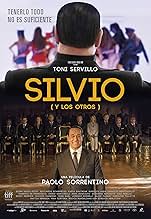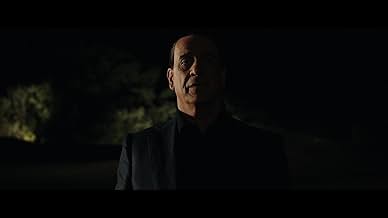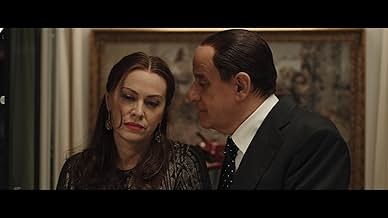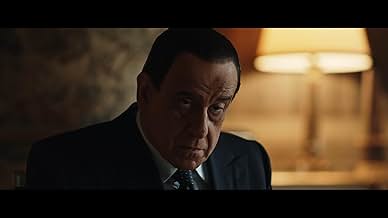AVALIAÇÃO DA IMDb
6,7/10
7,8 mil
SUA AVALIAÇÃO
Adicionar um enredo no seu idiomaAn escort-service owner uses his girls to get close to politician/PM and media mogul Silvio Berlusconi, but in 2006 he's preoccupied with his shaky marriage and losing an election.An escort-service owner uses his girls to get close to politician/PM and media mogul Silvio Berlusconi, but in 2006 he's preoccupied with his shaky marriage and losing an election.An escort-service owner uses his girls to get close to politician/PM and media mogul Silvio Berlusconi, but in 2006 he's preoccupied with his shaky marriage and losing an election.
- Direção
- Roteiristas
- Artistas
- Prêmios
- 1 vitória no total
Avaliações em destaque
Paolo Sorrentino's Loro is what can only be described as very, very Sorrentino; a pure distillation of his overriding thematic concerns and an anthology-like compendium of his stylistic tendencies. This is Sorrentino at his most Sorrentino-like. Released in Italy in two parts, Loro 1 (2018) ran 104 minutes and Loro 2 (2018) ran 100 minutes, the film was released internationally as one piece, running 145 minutes. Very much a thematic companion piece to O Divo (2008), and stylistically similar to the Oscar-winning masterpiece A Grande Beleza (2013), Loro is more interested in extravagant hedonism and Dionysian excess than the former and more satirical than the latter. Visually stunning, with a towering central performance from Toni Servillo (working with Sorrentino for the sixth time), some will criticise the film as all style, no substance; some will decry the lack of a strong forward-moving plot; some will take issue with the fact that Sorrentino seems reluctant to condemn Berlusconi; some will argue that in attempting to satirise the commodification of the female body, Sorrentino simply reproduces such commodification; some will find it too glossy and unrealistic; some will find it vulgar; some will find it sordid; some will regard the aping of Federico Fellini as too on the nose. And there's validity in each position, to one degree or another. As I said, it's very, very Sorrentino.
Written with his regular writing partner Umberto Contarello, Loro tells the "partly fictionalised" story of Silvio Berlusconi (Servillo) from the April 2006 general election (which he lost by a tiny margin) to the April 2009 L'Aquila earthquake and his return to power. Initially, we follow Sergio Morra (Riccardo Scamarcio), a pimp hoping to ingratiate himself with Berlusconi, to which end he rents the residence next door to Berlusconi's summer residence in Sardinia. Hoping the sight of the escorts partying will attract Berlusconi, unbeknownst to Morra, however, Berlusconi's attention is elsewhere. Finding himself in a political position to which he is unaccustomed (leader of the opposition), he is at something of a loss as to how to fill his day. Additionally, his marriage to Veronica Lario (Elena Sofia Ricci) is breaking down.
As will come as a shock to precisely no one, Loro looks absolutely amazing. There's Luca Bigazzi's gorgeous and vibrant cinematography, rendering Sardinia as a lazy, sun-kissed nirvana; Stefania Cella's luxurious and gaudy production design; Carlo Poggioli's decadent and seductive wardrobe; and Maurizio Silvi's makeup, hilariously recreating Berlusconi's waxen surgery-enhanced features and permatan, effectively turning Servillo into a human Ken doll. Sorrentino employs such lush, over-the-top beauty because he is satirising soulless elegance; that which is aesthetically pleasing but metaphysically empty. All-but drowning the audience in extraordinary, but ultimately meaningless opulence, however, he does run the risk of being accused of recreating and thus partially validating that which he has set out to satirise.
It's a fine line, but he walks it consistently. Take, for example, how he employs female nudity, of which there is a huge amount, almost all void of much in the way of narrative justification. On the surface, it's gratuitous nudity-for-nudity's sake. However, the lack of a meaningful rationale is precisely the point; to show that the characters dispassionately view women as commodities. Every male, and even some of the females (for example, Morra's business partner Tamara (Euridice Axen), and Kira (Kasia Smutniak), an acquaintance of Berlusconi's with whom Morra becomes infatuated) look at the escorts as objects whose bodies are for nothing beyond satisfying the lust of lascivious men and generating profit for their pimps, and the sight of so many beautiful young women degrading themselves for lecherous old men leaves a nasty aftertaste, precisely as is intended.
One of the most interesting facets of the film is how relatively lenient Sorrentino is - Berlusconi is not exactly sympathetic, but neither is he what you would call a villain. In this sense, the film reminded me of Oliver Stone's W. (2008). Part of the reason Berlusconi comes across as not completely reprehensible is because of Servillo, who is too intelligent a performer to allow any role to lapse into caricature. His Berlusconi remains always a bully, but he's also a man horrified by growing old, and his refusal to go gently into that good night is mixed with the occasional bout of regret. Servillo especially lets us see just how much it genuinely hurts Berlusconi when his marriage breaks down, as he is still desperately in love with Veronica, despite the fact that his behaviour has led her to despise him. On a more superficial level, Servillo perfectly captures Berlusconi's ridiculous grin, his obsession with opulence, his disdain for etiquette, and his ability to spin anything to make himself look good irrespective of the facts clearly showing that he's lying (and yes, it's supposed to remind us of a certain pathological liar currently living at 1600 Pennsylvania Avenue NW).
Thematically, a major issue is acquisition; of capital, of property, of power, of influence, of anything. The driving force of so many of the characters (especially people like Morra, Tamara, and Kira) is simply "more". These are people who can literally never be satisfied. Indeed, on three separate occasions, a character says, "Having it all isn't enough". Berlusconi's attitude to holding public office is similar, and is brilliantly dramatised in arguably the film's best scene. After deciding to return to politics, he tests himself to see whether he still has "it." Randomly cold-calling a gloomy housewife, he proceeds to sell her a luxury apartment that he admits hasn't even been built yet. It's a Servillo acting masterclass, and it's very funny, but it's also very telling - rather than brushing up on policy, or trying to clean his image up, this is how he prepares himself to attempt to topple the sitting government.
Another theme is the normalisation of decadence. For example, we see cocaine being snorted off escorts' naked bodies so often that by the time we get to the last half-hour or so, we don't even register it anymore. This isn't the case of a filmmaker accidentally overexposing a trope. Rather, overexposure is the trope; something like this should never be normalised, yet in this environment it most certainly is. In one brilliantly staged scene, as Morra and his escorts are walking through Rome, a garbage truck crashes and explodes, throwing its contents into the air before it rains down on the escorts. However, just as the garbage reaches them, the film cuts to a pool party in Morra's villa, and instead of garbage falling from the sky, the escorts are instead in the middle of a shower of ecstasy tablets.
However, for all its strengths, Loro is nowhere near the quality of Sorrentino's recent English-language output - Aqui é o Meu Lugar (2011), the horrifically underrated Juventude (2015), and the glorious The Young Pope (2016), whilst it pales in comparison to La grande bellezza (for my money one of the top twenty films of the century, thus far). Sure, this is perhaps the most quintessential Sorrentino film he has yet made, and everything that makes a film a "Sorrentino film" is present and accounted for - the visual opulence, the hedonistic milieu, the undercurrent of corruption and greed, the casual sexuality. However, unlike, say, La grande bellezza or The Young Pope, in Loro, the visual panache can often come across as an end unto itself, rather than serving the story and/or themes.
The biggest problem, however, is that structurally, the international cut is unable to escape the bifurcated narrative design of the original edits, with the story narratively and thematically divided into two halves. The first half focuses on Morra and a group of politicians and hangers-on (the eponymous "loro", meaning them); the second half focuses more tightly on Berlusconi himself, especially his relationship with Veronica, with the film rarely leaving his Sardinian estate. And as you can probably imagine, the transition is not entirely smooth, with entire subplots abandoned without explication or resolution, and important characters fade into the background and often disappear (Morra himself features in only a couple of scenes in the second half).
That said, however, this is still Sorrentino, so no matter the problems, there's always going to be much to admire. He's a master auteur and here turning his attention to perhaps Italy's most notorious post-War politician, he gets plenty of inspired mileage out of the tawdry subject matter. Very much a chronicler of the darkness behind Italy's sparkle, Sorrentino suggests that Berlusconi, and men like him, are driven by vanity and a desire for power as its own reward. Yes, the storyline is a little slack, and, yes, it somewhat unexpectedly finds humanity in the man, and yes, it's Sorrentino's weakest film for a while. But it's also a Sorrentino film. And for that, if nothing else, it's worth a look.
Written with his regular writing partner Umberto Contarello, Loro tells the "partly fictionalised" story of Silvio Berlusconi (Servillo) from the April 2006 general election (which he lost by a tiny margin) to the April 2009 L'Aquila earthquake and his return to power. Initially, we follow Sergio Morra (Riccardo Scamarcio), a pimp hoping to ingratiate himself with Berlusconi, to which end he rents the residence next door to Berlusconi's summer residence in Sardinia. Hoping the sight of the escorts partying will attract Berlusconi, unbeknownst to Morra, however, Berlusconi's attention is elsewhere. Finding himself in a political position to which he is unaccustomed (leader of the opposition), he is at something of a loss as to how to fill his day. Additionally, his marriage to Veronica Lario (Elena Sofia Ricci) is breaking down.
As will come as a shock to precisely no one, Loro looks absolutely amazing. There's Luca Bigazzi's gorgeous and vibrant cinematography, rendering Sardinia as a lazy, sun-kissed nirvana; Stefania Cella's luxurious and gaudy production design; Carlo Poggioli's decadent and seductive wardrobe; and Maurizio Silvi's makeup, hilariously recreating Berlusconi's waxen surgery-enhanced features and permatan, effectively turning Servillo into a human Ken doll. Sorrentino employs such lush, over-the-top beauty because he is satirising soulless elegance; that which is aesthetically pleasing but metaphysically empty. All-but drowning the audience in extraordinary, but ultimately meaningless opulence, however, he does run the risk of being accused of recreating and thus partially validating that which he has set out to satirise.
It's a fine line, but he walks it consistently. Take, for example, how he employs female nudity, of which there is a huge amount, almost all void of much in the way of narrative justification. On the surface, it's gratuitous nudity-for-nudity's sake. However, the lack of a meaningful rationale is precisely the point; to show that the characters dispassionately view women as commodities. Every male, and even some of the females (for example, Morra's business partner Tamara (Euridice Axen), and Kira (Kasia Smutniak), an acquaintance of Berlusconi's with whom Morra becomes infatuated) look at the escorts as objects whose bodies are for nothing beyond satisfying the lust of lascivious men and generating profit for their pimps, and the sight of so many beautiful young women degrading themselves for lecherous old men leaves a nasty aftertaste, precisely as is intended.
One of the most interesting facets of the film is how relatively lenient Sorrentino is - Berlusconi is not exactly sympathetic, but neither is he what you would call a villain. In this sense, the film reminded me of Oliver Stone's W. (2008). Part of the reason Berlusconi comes across as not completely reprehensible is because of Servillo, who is too intelligent a performer to allow any role to lapse into caricature. His Berlusconi remains always a bully, but he's also a man horrified by growing old, and his refusal to go gently into that good night is mixed with the occasional bout of regret. Servillo especially lets us see just how much it genuinely hurts Berlusconi when his marriage breaks down, as he is still desperately in love with Veronica, despite the fact that his behaviour has led her to despise him. On a more superficial level, Servillo perfectly captures Berlusconi's ridiculous grin, his obsession with opulence, his disdain for etiquette, and his ability to spin anything to make himself look good irrespective of the facts clearly showing that he's lying (and yes, it's supposed to remind us of a certain pathological liar currently living at 1600 Pennsylvania Avenue NW).
Thematically, a major issue is acquisition; of capital, of property, of power, of influence, of anything. The driving force of so many of the characters (especially people like Morra, Tamara, and Kira) is simply "more". These are people who can literally never be satisfied. Indeed, on three separate occasions, a character says, "Having it all isn't enough". Berlusconi's attitude to holding public office is similar, and is brilliantly dramatised in arguably the film's best scene. After deciding to return to politics, he tests himself to see whether he still has "it." Randomly cold-calling a gloomy housewife, he proceeds to sell her a luxury apartment that he admits hasn't even been built yet. It's a Servillo acting masterclass, and it's very funny, but it's also very telling - rather than brushing up on policy, or trying to clean his image up, this is how he prepares himself to attempt to topple the sitting government.
Another theme is the normalisation of decadence. For example, we see cocaine being snorted off escorts' naked bodies so often that by the time we get to the last half-hour or so, we don't even register it anymore. This isn't the case of a filmmaker accidentally overexposing a trope. Rather, overexposure is the trope; something like this should never be normalised, yet in this environment it most certainly is. In one brilliantly staged scene, as Morra and his escorts are walking through Rome, a garbage truck crashes and explodes, throwing its contents into the air before it rains down on the escorts. However, just as the garbage reaches them, the film cuts to a pool party in Morra's villa, and instead of garbage falling from the sky, the escorts are instead in the middle of a shower of ecstasy tablets.
However, for all its strengths, Loro is nowhere near the quality of Sorrentino's recent English-language output - Aqui é o Meu Lugar (2011), the horrifically underrated Juventude (2015), and the glorious The Young Pope (2016), whilst it pales in comparison to La grande bellezza (for my money one of the top twenty films of the century, thus far). Sure, this is perhaps the most quintessential Sorrentino film he has yet made, and everything that makes a film a "Sorrentino film" is present and accounted for - the visual opulence, the hedonistic milieu, the undercurrent of corruption and greed, the casual sexuality. However, unlike, say, La grande bellezza or The Young Pope, in Loro, the visual panache can often come across as an end unto itself, rather than serving the story and/or themes.
The biggest problem, however, is that structurally, the international cut is unable to escape the bifurcated narrative design of the original edits, with the story narratively and thematically divided into two halves. The first half focuses on Morra and a group of politicians and hangers-on (the eponymous "loro", meaning them); the second half focuses more tightly on Berlusconi himself, especially his relationship with Veronica, with the film rarely leaving his Sardinian estate. And as you can probably imagine, the transition is not entirely smooth, with entire subplots abandoned without explication or resolution, and important characters fade into the background and often disappear (Morra himself features in only a couple of scenes in the second half).
That said, however, this is still Sorrentino, so no matter the problems, there's always going to be much to admire. He's a master auteur and here turning his attention to perhaps Italy's most notorious post-War politician, he gets plenty of inspired mileage out of the tawdry subject matter. Very much a chronicler of the darkness behind Italy's sparkle, Sorrentino suggests that Berlusconi, and men like him, are driven by vanity and a desire for power as its own reward. Yes, the storyline is a little slack, and, yes, it somewhat unexpectedly finds humanity in the man, and yes, it's Sorrentino's weakest film for a while. But it's also a Sorrentino film. And for that, if nothing else, it's worth a look.
Just a brilliant movie that seeks to explain Berlusconi (him, him), why people want to get next to him, why people want to get away from him and what he ment to (some) of the people.
Sorrentino is on top form with extravagant dance/fantasy pieces, biting symbolism and a superb performance by Tony Servillo at its centre.
Wonderful production values, from the costumes, lighting, sets and supporting cast.
A must see, that can summed up by one of the end scenes when Berlusconi finally lights his volcano garden ornament that he has been threatening to do all film and all we see is a sad display that makes us feel the same way about him, him. 'Is that all there is to it?'
Sorrentino is on top form with extravagant dance/fantasy pieces, biting symbolism and a superb performance by Tony Servillo at its centre.
Wonderful production values, from the costumes, lighting, sets and supporting cast.
A must see, that can summed up by one of the end scenes when Berlusconi finally lights his volcano garden ornament that he has been threatening to do all film and all we see is a sad display that makes us feel the same way about him, him. 'Is that all there is to it?'
Greetings again from the darkness. Silvio Berlusconi is a former Prime Minister of Italy, having served four times. He is also a billionaire businessman who has been deeply involved with Italian politics for more than 20 years. Berlusconi is in his 70's and has been convicted of tax fraud, accused of conflicts of interest, and is well known for his brash and charismatic personality, as well as his scandalous personal lifestyle and numerous controversies. None of that is required information prior to watching the movie since it's described as a "fictional" account, but it does help to have a basic understanding of the man.
It should be noted that the film was originally released as Part 1 and Part 2. The international version I watched has been edited to 151 minutes, almost one hour shorter than the two parts combined. It begins by following Sergio Morra, a charming hustler and schemer played by Riccardo Scamarcio (JOHN WICK 2). Along with his wife Tamara (Euridice Axen), he runs a prostitution and escort ring of beautiful young ladies ... each willing to show and do whatever is necessary to obtain money, drugs, and a career or rich husband. It becomes apparent that Sergio really wants a chance to meet with "him", Silvio Berlusconi, in hopes of some type of business partnership. Sergio's meeting with Silvio's lead mistress Kira (Kasia Smutniak) cracks the door that he so wishes to enter.
Sergio throws a party at Villa Morena, the home next to Silvio's sprawling Sardinia country estate. Decadence and wild activities abound, as does dancing by the swimming pool to the thumping Italian techno music. There seem to be no rules, or even etiquette, at the party where nudity, drugs and booze are commonplace. The party gets Silvio's attention and he agrees to meet with Sergio. It's at this point where the film shifts to its second narrative. No longer focused on Sergio, the story becomes all Silvio.
Toni Servillo delivers a tour de force as Silvio Berlusconi. Sure, he is masked in make-up to capture the look of someone trying hard to look younger than they are - but that's exactly what Silvio did (and does). Mr. Servillo manages to become the larger-than-life figure that commands attention in every crowd and every room. Elena Sofia Ricci plays Veronica Lario, Silvio's wife. We witness their crumbling marriage and the unhappiness she has each day. Silvio's process with everyone, including his wife, is to shift into smooth political salesman mode. In fact, one of the greatest scenes of all movies this year has Silvio re-capturing his early days as a real estate salesman as he pushes a non-existent apartment on a lonely housewife. The scene features fascinating acting, writing and filmmaking in one fell swoop.
Director Paolo Sorrentino is best known for his Foreign Language Oscar for the fantastic THE GREAT BEAUTY (2013). This film is more extreme and harsh than that one was, and Sorrentino co-wrote this script with Umberto Contarello. Frequent collaborator Luca Bigazzi delivers terrific cinematography. At times the film looks like one lavish fashion shoot. The score and music come from Lele Marchitelli and play a crucial role throughout. Italy is presented here as having declined into a state of hedonism with mass debauchery. It's uncomfortable watching women stoop to these levels in hopes of being recognized and rewarded with some type of affirmation - either a better career, more wealth, or whatever their dreams might be. A powerful man is there to take advantage of such insecurities. The film touches on Silvio's political power and the aftermath of the L'Aquila earthquake. Much of the film focuses on the overall amorality of those involved, and though the actions of these folks might go against our own standards, we will admit that filmmaker Sorrentino has a knack for making something so vulgar still look darn good on screen.
It should be noted that the film was originally released as Part 1 and Part 2. The international version I watched has been edited to 151 minutes, almost one hour shorter than the two parts combined. It begins by following Sergio Morra, a charming hustler and schemer played by Riccardo Scamarcio (JOHN WICK 2). Along with his wife Tamara (Euridice Axen), he runs a prostitution and escort ring of beautiful young ladies ... each willing to show and do whatever is necessary to obtain money, drugs, and a career or rich husband. It becomes apparent that Sergio really wants a chance to meet with "him", Silvio Berlusconi, in hopes of some type of business partnership. Sergio's meeting with Silvio's lead mistress Kira (Kasia Smutniak) cracks the door that he so wishes to enter.
Sergio throws a party at Villa Morena, the home next to Silvio's sprawling Sardinia country estate. Decadence and wild activities abound, as does dancing by the swimming pool to the thumping Italian techno music. There seem to be no rules, or even etiquette, at the party where nudity, drugs and booze are commonplace. The party gets Silvio's attention and he agrees to meet with Sergio. It's at this point where the film shifts to its second narrative. No longer focused on Sergio, the story becomes all Silvio.
Toni Servillo delivers a tour de force as Silvio Berlusconi. Sure, he is masked in make-up to capture the look of someone trying hard to look younger than they are - but that's exactly what Silvio did (and does). Mr. Servillo manages to become the larger-than-life figure that commands attention in every crowd and every room. Elena Sofia Ricci plays Veronica Lario, Silvio's wife. We witness their crumbling marriage and the unhappiness she has each day. Silvio's process with everyone, including his wife, is to shift into smooth political salesman mode. In fact, one of the greatest scenes of all movies this year has Silvio re-capturing his early days as a real estate salesman as he pushes a non-existent apartment on a lonely housewife. The scene features fascinating acting, writing and filmmaking in one fell swoop.
Director Paolo Sorrentino is best known for his Foreign Language Oscar for the fantastic THE GREAT BEAUTY (2013). This film is more extreme and harsh than that one was, and Sorrentino co-wrote this script with Umberto Contarello. Frequent collaborator Luca Bigazzi delivers terrific cinematography. At times the film looks like one lavish fashion shoot. The score and music come from Lele Marchitelli and play a crucial role throughout. Italy is presented here as having declined into a state of hedonism with mass debauchery. It's uncomfortable watching women stoop to these levels in hopes of being recognized and rewarded with some type of affirmation - either a better career, more wealth, or whatever their dreams might be. A powerful man is there to take advantage of such insecurities. The film touches on Silvio's political power and the aftermath of the L'Aquila earthquake. Much of the film focuses on the overall amorality of those involved, and though the actions of these folks might go against our own standards, we will admit that filmmaker Sorrentino has a knack for making something so vulgar still look darn good on screen.
This international cut of Paolo Sorrentino's sumptuous-looking biopic of Italian media tycoon-turned-former Prime Minister Silvio Berlusconi (1936-) runs 145 minutes, collated and edited from LORO I and II which were subsequently released in Italy and in toto clock in at 204 minutes, nearly one-hour length of footage is truncated (may it all be bikini-clad, pneumatic girls roistering in abandonment), so for cinematic purist, please refrain from this version.
Otherwise, let's dive into this sybaritic adventure which kick-starts with a wacky caveat: a kawaii lamb plumb drops dead seconds after it stumbles into the cavernous living room of Berlusconi's summer residence in Sardinia, the message seems clear - Agnus Dei aka. innocence cannot survive in that toxic environs.
It takes a good 40 minutes before Mr. Berlusconi's first official appearance, during which, Sergio Morra (Scamarcio), who runs an escort business in Taranto with his partner Tamara (Axen), aims to branch out by getting the former PM's attention - who is scheming to win the upcoming 2008 election - through the brokering of Kira (Smutniak), Silvio's current mistress, among others. Sergio arranges a rip-roaring party mainly consisted of barely-clad nubile girls, in a rented villa right in front of Berlusconi's. Will he rise to the bait? There is no question about that.
First time Mr. Berlusconi (Servillo) entering the scene, he is dressed like an Arabian woman, veiled and everything, holding a posy and trying to delight his estranged wife Veronica Lario (Ricci), but her dismissal hits like an icy knife, "Don't be a clown, Silvio." an inner voice exclaims. Indeed, Sorrentino's tack is to peel off this plutocrat's layered guises to reveal what he is made of, a salesman and a clown, two bullet points are shored up by a nocturnal cold call to prove he still gets his pitchman mojo and the irreparable dissolution of his 20-year-old marriage with Veronica, who despises him for his incapacity in statecraft and unrestrained debauchery. And there is more spiteful sideswipe, what is at the rainbow's end for an elderly man who literally has everything in his life? His long lost youth, of course, Sorrentino's senescent barbs levering at a septuagenarian through the mouth of a 20-year-old nubile girl Stella (Pagani), whom Silvio intends to bed in the course of another lavish quarry-hunting party organized by Sergio, is piercingly cruel, and even afterwards, he dredges up the spat and tries to erase its verity by a wisecrack, but a passing thought is: if Stella's grandfather indeed shares the same denture cleaner as his, she might not need to be at that pathetic party in the first place.
Contrasting the unconscionable razzle-dazzle (which Sorrentino has honed to the hilt with a dash of absurdity and saturated bling-bling pizzazz) with a muted emptiness - which seeps in in the wake of the calamitous 2009 L'Aquila earthquake occurring after Berlusconi's re-election, the way Sorrentino linking these two events together deviously implies that the calamity could be the Almighty's irate answer towards his ascendency, LORO (means "them" in English) finally junks it materialistic ballast/frippery as well as the subplot of Sergio's grasping pursuance, in lieu, Berlusconi's self-reflexion tangentially alludes to an inconvenient truth: a leader's characteristics reflect those of the multitude who chooses him, and now, they want Jesus back.
Toni Servillo is, to be expected, superbly eloquent and all-around (also playing Ennio Doris, a billionaire businessman and one of Berlusconi's closest associates) in embodying a well-known real-life character whose tics and elocution the mass (Italian audience in particular) is very au fait with, subtly buries his diligent imitation under a self-parodying conviviality (top-notch make-up achievement too), shouldn't one be alert if his Berlusconi comes off as rather sympathetic? Among a vast supporting characters, Scamarcio and Smutniak both turn heads, but it is Elena Sofia Ricci who plays off Servillo's motor-mouthed accusation and interrogation with a calm but smoldering despair that preciously retains her vestigial dignity.
LORO is largely what one can expect from Sorrentino's sardonic disposition and ostentatious modus operandi, even if your mileage may vary towards his controversial subject, at the very least, we must hand it to Sorrentino for laying an undue outpouring of his outrageous brainwaves with an enormous trowel.
Otherwise, let's dive into this sybaritic adventure which kick-starts with a wacky caveat: a kawaii lamb plumb drops dead seconds after it stumbles into the cavernous living room of Berlusconi's summer residence in Sardinia, the message seems clear - Agnus Dei aka. innocence cannot survive in that toxic environs.
It takes a good 40 minutes before Mr. Berlusconi's first official appearance, during which, Sergio Morra (Scamarcio), who runs an escort business in Taranto with his partner Tamara (Axen), aims to branch out by getting the former PM's attention - who is scheming to win the upcoming 2008 election - through the brokering of Kira (Smutniak), Silvio's current mistress, among others. Sergio arranges a rip-roaring party mainly consisted of barely-clad nubile girls, in a rented villa right in front of Berlusconi's. Will he rise to the bait? There is no question about that.
First time Mr. Berlusconi (Servillo) entering the scene, he is dressed like an Arabian woman, veiled and everything, holding a posy and trying to delight his estranged wife Veronica Lario (Ricci), but her dismissal hits like an icy knife, "Don't be a clown, Silvio." an inner voice exclaims. Indeed, Sorrentino's tack is to peel off this plutocrat's layered guises to reveal what he is made of, a salesman and a clown, two bullet points are shored up by a nocturnal cold call to prove he still gets his pitchman mojo and the irreparable dissolution of his 20-year-old marriage with Veronica, who despises him for his incapacity in statecraft and unrestrained debauchery. And there is more spiteful sideswipe, what is at the rainbow's end for an elderly man who literally has everything in his life? His long lost youth, of course, Sorrentino's senescent barbs levering at a septuagenarian through the mouth of a 20-year-old nubile girl Stella (Pagani), whom Silvio intends to bed in the course of another lavish quarry-hunting party organized by Sergio, is piercingly cruel, and even afterwards, he dredges up the spat and tries to erase its verity by a wisecrack, but a passing thought is: if Stella's grandfather indeed shares the same denture cleaner as his, she might not need to be at that pathetic party in the first place.
Contrasting the unconscionable razzle-dazzle (which Sorrentino has honed to the hilt with a dash of absurdity and saturated bling-bling pizzazz) with a muted emptiness - which seeps in in the wake of the calamitous 2009 L'Aquila earthquake occurring after Berlusconi's re-election, the way Sorrentino linking these two events together deviously implies that the calamity could be the Almighty's irate answer towards his ascendency, LORO (means "them" in English) finally junks it materialistic ballast/frippery as well as the subplot of Sergio's grasping pursuance, in lieu, Berlusconi's self-reflexion tangentially alludes to an inconvenient truth: a leader's characteristics reflect those of the multitude who chooses him, and now, they want Jesus back.
Toni Servillo is, to be expected, superbly eloquent and all-around (also playing Ennio Doris, a billionaire businessman and one of Berlusconi's closest associates) in embodying a well-known real-life character whose tics and elocution the mass (Italian audience in particular) is very au fait with, subtly buries his diligent imitation under a self-parodying conviviality (top-notch make-up achievement too), shouldn't one be alert if his Berlusconi comes off as rather sympathetic? Among a vast supporting characters, Scamarcio and Smutniak both turn heads, but it is Elena Sofia Ricci who plays off Servillo's motor-mouthed accusation and interrogation with a calm but smoldering despair that preciously retains her vestigial dignity.
LORO is largely what one can expect from Sorrentino's sardonic disposition and ostentatious modus operandi, even if your mileage may vary towards his controversial subject, at the very least, we must hand it to Sorrentino for laying an undue outpouring of his outrageous brainwaves with an enormous trowel.
This film was definitely a wild one. It starts out very strong and I really liked the direction it went with early on. The momentum was great however it did start to dissipate. I think this is due to the overwhelming conflicts that were developing throughout the movie. The film has multiple layers that seem to overlap one another, and although interesting it was also confusing. There were some really epic scenes, and the overall vibe was very fun, so I did enjoy watching the film. That being said it still leaves you kind of scratching your head. It is hard to find the overall artistic direction or message behind the film.
Você sabia?
- CuriosidadesThis 145-minute cut combines scenes from both Loro 1 (2018) and Loro 2 (2018). It has been made in order to allow the movie to be released outside of Italy as a standalone film.
- Citações
Kira: Do you believe in God?
Sergio Morra: Of course. Well, only on Mondays...
Principais escolhas
Faça login para avaliar e ver a lista de recomendações personalizadas
- How long is Loro?Fornecido pela Alexa
Detalhes
- Data de lançamento
- Países de origem
- Centrais de atendimento oficiais
- Idioma
- Também conhecido como
- Them
- Locações de filme
- Ansedonia, Orbetello, Grosseto, Tuscany, Itália(Villa Morena in Sardegna: 20 Via delle Mimose)
- Empresas de produção
- Consulte mais créditos da empresa na IMDbPro
Bilheteria
- Faturamento bruto nos EUA e Canadá
- US$ 35.613
- Fim de semana de estreia nos EUA e Canadá
- US$ 5.317
- 22 de set. de 2019
- Faturamento bruto mundial
- US$ 36.567
- Tempo de duração2 horas 31 minutos
- Cor
- Mixagem de som
- Proporção
- 2.40 : 1
Contribua para esta página
Sugerir uma alteração ou adicionar conteúdo ausente



































